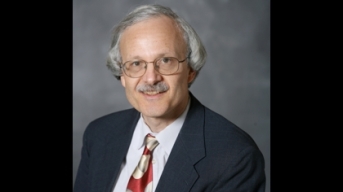
Professor Charles Tiefer
Professor Charles Tiefer was among three professors invited to take part Wednesday afternoon in a Capitol Hill hearing on Congress’ role in investigating the Russian hacking scandal and related matters.
The June 7 hearing was organized by Rep. Sheila Jackson Lee (D-Texas), a ranking member of the U.S. House of Representatives Judiciary Subcommittee on Crime, Terrorism, Homeland Security and Investigations. Rep. John Lewis of Georgia is among the other Democratic representatives on the subcommittee.
Tiefer, who served as general counsel (acting) of the House before he began teaching at UB in 1995, wrote about the briefing in Forbes.com the following day, hours after fired FBI director James Comey testified before the Senate Intelligence Committee. Read “In Comey’s Wake, the House Needs to Investigate Trump More” (June 8, 2017).
The June 7 House hearing was titled “Special Counsel: What are the next steps? What are the constitutional duties of the United States Congress?” Also taking part were Allan Lichtman, professor of U.S. political history at American University, and Michael Gerhardt, professor of constitutional law at the University of North Carolina School of Law.
Tiefer was the special deputy chief counsel of the House Iran-Contra Committee in the late 1980s. He has written extensively on investigative issues, including the matters that led to the impeachment of President Bill Clinton.
Tiefer told the House subcommittee and audience members that included several members of Congress that congressional investigations of the Russia matter should proceed even though a special counsel, former FBI Director Robert Mueller III, has been appointed to investigate ties between the Trump campaign and Russian officials.
“Washington has a strong history of simultaneous investigations by special prosecutors and congressional committees,” Tiefer said, citing inquiries into the Watergate, Iran-Contra and Monica Lewinsky affairs.
During the Watergate scandal, he noted, special prosecutors Archibald Cox and Leon Jaworski worked at the same time as the House Judiciary Committee under leader Peter Rodino.
In the case of the Reagan-era Iran-Contra affair, Tiefer spoke from personal knowledge: “I served as special deputy chief counsel of the House Iran-Contra committee,” he said. “Independent Counsel Lawrence Walsh worked at the same time as our House committee, which included House Judiciary leader Peter Rodino (again).”
Tiefer noted that numerous congressional investigations took place during Clinton’s tenure, culminating in the House Judiciary Committee impeachment action by Chairman Henry Hyde over the Lewinsky affair, which took place while independent counsel Kenneth Starr worked simultaneously on the same matter.
Said Tiefer: “There are many important reasons for this consistent pattern of congressional investigations of presidential matters, with Judiciary Committee members in the forefront, at the same time as special counsels. A special counsel has his limits. Apart from trials, he has no forum like briefings, hearings, or even floor speeches and press releases, to present the press and the public with the evidence. He proceeds in secret and no one knows what he uncovers.”
Moreover, Tiefer pointed out, a special counsel focuses on prosecutions.
“A special prosecutor might, as Independent Counsel Walsh did, focus on the figures whom he might indict and convict, like Oliver North,” Tiefer said, emphasizing that a special prosecutor might not think of the president as someone readily subject to indictment and conviction. (Tiefer noted that neither the Watergate special prosecutors, nor Walsh or Starr ever indicted a president during his term.)
In short, Tiefer said, a special prosecutor may not focus on the president the way Congress would.
In contrast, Tiefer said, “Congressional investigations of presidential matters, especially by the House Judiciary Committee with its special mandate, have a different and necessary reason for their consistent pattern of proceeding even with special counsel out there.”
Such congressional investigations are the “eyes and ears of the nation,” Tiefer said.
“They are the avenue through which the House performs its function of examining presidential matters,” he continued. “And as elected leaders, they are allowed to, and expected, under the Constitution, to bring a kind of publicly representative judgment to presidential matters – in fact, crystallizing the judgment of the nation — that a special counsel does not.”
Another question that must be asked, Tiefer said, is: When can the members of the House Judiciary Committee start doing their investigative job?
“As House counsel, I worked with House committees countless times, including when they got started, and I have a very practical sense of what it means to ‘start doing their job,’” he said. “It means to get up out of their seats, if you excuse my putting it so bluntly, and go out to gather documents and interview witnesses. … In my experience, to get going all you need is a pad and pen and some ideas about whom to talk to.”
Tiefer emphasized that “there is a whole universe of material to be gathered from sources who are not recalcitrant.”
Posing a rhetorical question, Tiefer asked if the custodians of documents and witnesses would consider the current matter serious enough to merit their working with the House Judiciary Committee.
Tiefer then reminded his listeners that House Judiciary Committee leader Henry Hyde took the Monica Lewinsky matter with great seriousness and gathered the evidence for his impeachment of President Clinton.
Concluded Tiefer: “I think many knowledgeable sources will view the matters at issue today to be at least as worthy of inquiry by the House Judiciary Committee, if not more worthy of inquiry, than Monica Lewinsky.”

